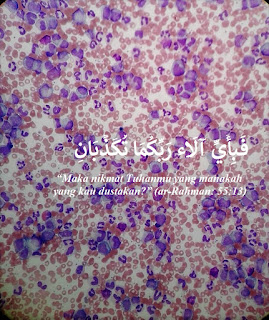//Above is a snapshot of an abnormal blood smear magnified under the microscope
I'm doing Haematology posting. To be honest, I have always though that Haematology as a world of its own, a foreign sub-specialty even though we learnt the basic stuff in medical school. The first day of my first weekend round in Haemato, Dad sent me to the hospital and asked which posting I am in currently. When I said Haemato he went, “About blood only right? It should be easy, yes?”. I almost went berserk at that statement XD
Blood composed of a lot of constituents which include red cells, white cells, plasma, coagulation factors, platelets etc. Your white cells further have different types i.e. your granulocytes (neutrophils, basophils, eosinophils), monocytes, lymphocytes (B-lymphoctyes, T-lymphocytes, NK-cells). Each of these red and white cells as well as platelets come from a common precursor/immature cells called haemapoeitic stem cell that later differentiate into different cell lineage. Amazing yes?
During the process of differentiation and maturation, at any step the process could go wrong and thus causing your haematological cancer (leukaemia, lymphoma, multiple myeloma), and there could also be structural defects or enzymatic / constituent defects for example in red blood cells (thalassaemia, sickle cell anaemia, iron defienciency anaemia, G6PD (enzyme defiency which cause your red cells to breakdown when exposed to certain agents), haemolytic anaemia where your red cells breakdown for different reasons e.g. infection, malignancy, immune mediated where your immune system attack the red cells), or deficiency in any of the other blood products (e.g. coagulation Factor VIII or IX deficiency in haemophilia or thrombocytopenia which is low platelet which can be due to different reasons) or too much production for example in polycythaemia rubra vera where red cells production is excessive. Not only that, your bone marrow i.e. the factory that produces blood can also have problems i.e. not producing enough blood like in aplastic anaemia, myelofibrosis or abnormal production e.g. myelodysplastic syndrome. I can go on and on and on and the list will just continue.
For us, once you recognize a problem or an issue, the next step is how to manage it.
Back in medical school, our Dean Prof Hatta, taught us a prayer that I still recite until now - "O Allah the Most Merciful, the Most Benevolent, please let us be the tool of your Mercy in serving the humanity regardless of race, creed and religion"
I currently have a few patients under my care who are around my age- One gentleman with a very rare refractory extranasal, extranodal NK-T cell lymphoma whose disease is far ahead of us and kept coming faster than the next cycle of chemotherapy and he would be in pain, because the cancer “grows” on his muscles and bones. If you want to look at it from the point of “fighting cancer”, we’re definitely at the loosing end. Patient and family however is still looking for a miraculous cure.
Another gentleman with progressive lymphoma, now affecting his central nervous system which made me learn about Omaya Shunt and intraventricular chemotherapy. His condition is complicated with many infections after infections which affect his chemotherapy schedule. He asked “why did I get (all) these (infections), Dr?” My reply, because he's immunocompromised, meaning his immune system is low hence he could easily catch any sort of infection. But beneath that question is, "Why me?"
Haematology for me is a very humbling posting- from dealing and learning from these patients, to learning from my consultants and specialists; amazed at the level of passion and care they have for their patients, and it made me realized again and again that the more I learn, the more I don't know...
"Which then of the bounties (favours, gifts) of your Lord will you deny?"
[ar-Rahman 55:13]


No comments:
Post a Comment